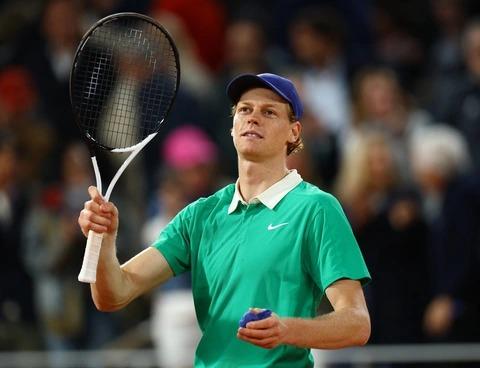Carlos Alcaraz, the young Spanish tennis prodigy, recently consecrated champion of the France Open after an electrifying victory over Jannik Sinner. However, what could have been simply a sports celebration quickly became a media controversy when Alcaraz made a statement that left many speechless.
During the fifth set of the intense end, in which both players struggled for each point, Alcaraz, visibly exhausted, addressed the organizers of the tournament and exclaimed aloud: “He has something in his drink.” Alcaraz’s words echoed in the stadium, creating a cloud of suspicion in the air. Alcaraz’s comment referred to the surprising increase in energy that he showed Sinner in that set, which generated doubts about the nature of his physical recovery.
The young Spanish tennis player, known for his technical ability and his mental approach in the game, expressed concern that something could be altering the performance of his opponent. The accusation was serious, since it suggested that Sinner could have resorted to an external substance to increase its performance in the field. These types of accusations are never easy to handle, especially in an event of the magnitude of the France Open, where the integrity of the sport is always under thorough scrutiny.
The tournament organizers quickly responded to Alcaraz’s request, ensuring that they would make the necessary verifications on the Sinner drink. However, what happened later surprised everyone. Official reports confirmed that no suspicious substances were found in the Sinner drink. Despite this, Alcaraz’s statement left a lasting impression in the tennis community, generating a debate about the nature of sport and the possible pressures that players face in times of maximum tension.
This controversy has also put in the foreground the constant struggle in professional tennis to maintain a level of equity in competition. While Sinner denied any improper use of substances, many began to question whether the energy increase of a player in the key moments of the game could be related to other factors outside their control. The intense rivalry between Alcaraz and Sinner, two of the most promising young talents of tennis, is now dyed by the shadow of this dispute.
What is clear is that, despite the efforts to maintain the purity of the game, there are always temptations that defy the integrity of sport. The response of the organizers, however, reaffirms the commitment to transparency and justice in tennis. In this context, Alcaraz remained firm in his conviction that transparency is crucial to maintain the confidence of fans.
The incident has not only added a layer of drama to the already fascinating rivalry between Alcaraz and Sinner, but has also left the world of tennis reflecting on the pressures and expectations faced by players in elite competitions. Meanwhile, the question persists: Does the trick really are the trick, or the mental pressure in high -level tennis can lead players to question even the slightest details of their performance?
In short, this story has only adds a new intriguing chapter to the narrative of modern tennis.